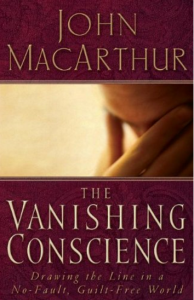
Author: MacArthur, John
Genre: Theology - General
Tags: Christian Living / Cross / Discipleship, Culture / Worldview, Doctrine / Theology
Series:
Rick Shrader‘s Review:
This is a well written book on an important subject. Regardless of your view of the author’s previous books, this is a subject on which every Christian should read. MacArthur has little time for the self-help and self-esteem teachings and believes we already think more highly of ourselves than we ought to think and that our consciences are hardened away from self-abasement.
He writes, ‘‘My prayer is that this book will help to prompt Evangelicals to turn again with new appreciation to the biblical doctrines of human depravity, sin, and the role of the conscience, leading to personal holiness.’’ He defines the conscience as that which ‘‘entreats us to do what we believe is right and restrains us from doing what we believe is wrong. The conscience is not to be equated with the voice of God or the law of God. It is a human faculty that judges our actions and thoughts by the light of the highest standard we perceive.’’
I do not agree with the author’s equation of ‘‘the old man’’ (p. 137) with ‘‘the old nature’’ (p. 217) and the resulting view that we have only one nature. For a definitive answer to that view see the ‘‘Bib-Sac’’ answer to David Needham’s book, Birthright, January, 1984.
MacArthur pulls no punches in his evaluation of the contemporary church: “The weakness of the church is not that we’re too uninvolved in the social and political realms of our society, but that we too easily absorb the false values of an unbelieving world. The problem is not too little activism, but too much assimilation.”
